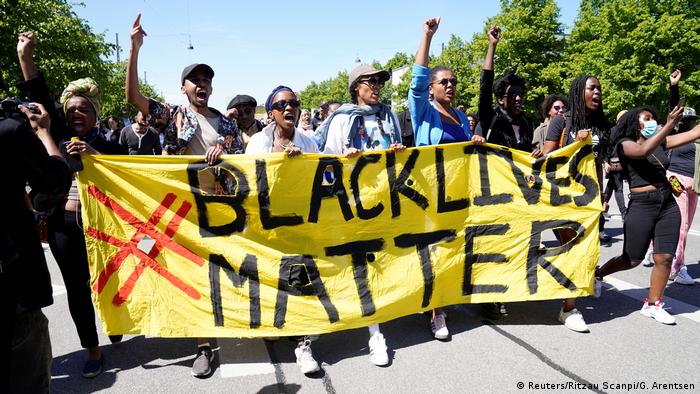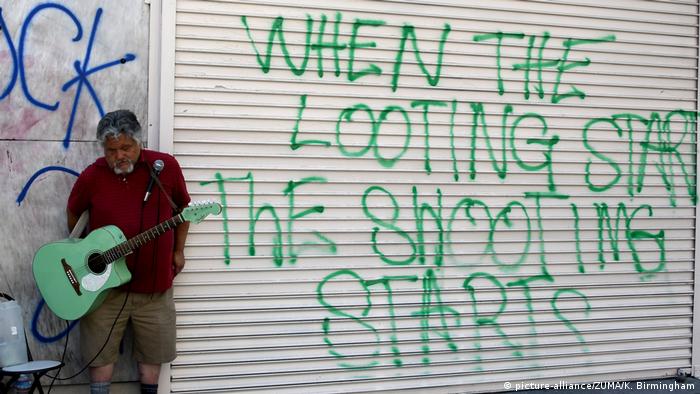Opinion: Systemic racism is the real 'American carnage'
A majority of white Americans still cannot come to terms with what black people have known forever: Racism is systemic, systematic, and nowhere near gone. White America must step up not just for peace, but for justice.

The images of burning police cars, clouds of tear gas, looted stores, law enforcement officers pushing civilians to the ground and protesters marching undeterred are startling and shocking for us Americans, but they are not surprising.
The video of an African American man dying on camera under the weight of a white police officer's knee on his neck is gruesome and shocking. It, too, is not surprising — we have seen videos like these before.
Echoes of the 2015 protests in Ferguson, Missouri, come to mind; for older generations, it is deja vu to the Rodney King riots of 1992 and lynchings during the civil rights movement.
But today's mass protests are gripping the nation at a time when a pandemic has claimed more than 100,000 lives, with more than 30 million unemployed, sky-high wage and income inequality and political polarization that is tearing the country apart.
It now feels like the US is reaching a breaking point. The future of the country seems bleak and uncertain. What we are seeing is "American carnage" — but not of the sort Donald Trump likely imagined when he strangely invoked that term at his presidential inauguration.
Racism doesn't take a break
While America went on lockdown due to the coronavirus pandemic, much of what characterizes normal life stopped. But the country's more fundamental and structural problems continued. Systemic racism is one of them, with numerous examples evident even as normal life came to a halt in recent months.
In February, video showed Ahmaud Arbery, a black man, being shot by two white vigilantes while out for a jog in Georgia.
In another video, a woman in New York's Central Park is seen calling the police on a black man who asked her to follow park rules and leash her dog, immediately telling them that "an African American man" was there and falsely claiming he was "threatening" her and the dog.
As the pandemic unfolded, people of color have suffered disproportionately high death rates from the coronavirus — also an indirect result of systemic inequality and racism. Yet armed white demonstrators occupied various state capitols to protest lockdown rules and shouted, intimidated and even spit at police officers, who handled them with the utmost care, in a glaring reminder that whites are treated differently by police.
Polarization blocks progress
Like nearly every topic in the US right now, the role of police and the criminal justice system are seen along political and racial lines. The 2015 Ferguson protests led to the creation of Black Lives Matter, a movement dedicated to increasing awareness of systemic racism and fighting the individual and collective biases that perpetuate it.
In response, countermovements popped up with the slogans "All Lives Matter," affirming the belief that Americans live in a colorblind society, and "Blue Lives Matter," promoting the view that police are heroes and have allegedly been framed for race-related violence.

DW reporter Jenipher Camino Gonzalez
It is no surprise that these movements have largely been supported by conservative-leaning whites. Polls have consistently shown that public trust for the police is higher among Republican voters, white and older people, while only a minority of Hispanics, African Americans, young people and Democrats share that trust.
In 2020, these opposing demographic, racial, and political lines are at their most antagonistic, fueling the country's ongoing fragmentation and tribalism.
These groups are actively kept apart by opportunistic political leaders like Trump, who actively stokes discord and whose place in the White House is a direct result of this high polarization and its resulting culture wars.
In such a deadlock, progress is blocked, and US streets will remain susceptible to bouts of violence.
White complacency must end
Statistics show it, studies expand on it and videos like those of George Floyd's killing crystallize it: African Americans are disproportionately targeted by police. Still, many white Americans cannot admit that the country's criminal justice system and police culture protect and benefit them.
Many white Americans cannot admit that racism remains an inherent societal problem and state structures are in dire need of reform to achieve equal treatment for the citizens they purport to serve. This inability of so much of white America to come to terms with its own privilege and empathize with minorities' experiences is the single largest roadblock to progress and reconciliation.
Those who are part of the problem must be part of the solution. People of color cannot single-handedly change a system that is inherently skewed against them; nor should they be forced to try. Throughout history, black mobilization has required a critical mass of white people joining the fight to tip the balance toward progress — during the abolitionist movement, the black suffrage movement, the civil rights movement.
The same is true today — but at a time when political tribalism reigns, can this happen once again? The challenge has never been so great and the stakes so high. If there is to be progress toward eliminating prejudice and racial violence, white Americans must stop being complacent about systemic racism.
IN PICTURES: US PROTESTS OVER GEORGE FLOYD, POLICE KILLINGS RAGE IN DOZENS OF CITIES

When the looting starts…'
President Donald Trump has threatened to send in the military to quell the protests, saying his "administration will stop mob violence and will stop it cold." Trump's response has inflamed tensions across the country. He blamed the rioting on alleged far-left groups, but Minnesota Governor Tim Walz told reporters he had heard multiple unconfirmed reports of white supremacists stoking the violence. 123456789
DW RECOMMENDS
Opinion: George Floyd killing opens racism wounds for European blacks
"There's no relief for me that I live in Germany," writes DW's Chiponda Chimbelu, as he reflects on the European reaction to the killing of George Floyd. It's a moment for Europe to reflect on its own racism, he adds. (01.06.2020)
Opinion: Athletes deserve freedom of expression
A handful of Bundesliga players signaled support for the fight against racism after the killing of George Floyd. DW's Jonathan Harding says they have every right to do so — and now is the time to offer support. (31.05.2020)
George Floyd killing: US cities deploy National Guard to quell riots
Protests, some violent, have escalated across the United States with people angry at the killing in police custody of unarmed black man George Floyd. Authorities in Minneapolis have vowed a stronger police presence. (30.05.2020)
AUDIOS AND VIDEOS ON THE TOPIC
From Ferguson, Missouri to Minneapolis, Minnesota
Date 31.05.2020
Author Jenipher Camino Gonzalez
Related Subjects The United Nations Children's Fund (UNICEF), Human Rights
Keywords USA, racism, George Floyd, police violence, human rights
From Ferguson, Missouri to Minneapolis, Minnesota
Date 31.05.2020
Author Jenipher Camino Gonzalez
Related Subjects The United Nations Children's Fund (UNICEF), Human Rights
Keywords USA, racism, George Floyd, police violence, human rights
Permalink https://p.dw.com/p/3d4rE
No comments:
Post a Comment